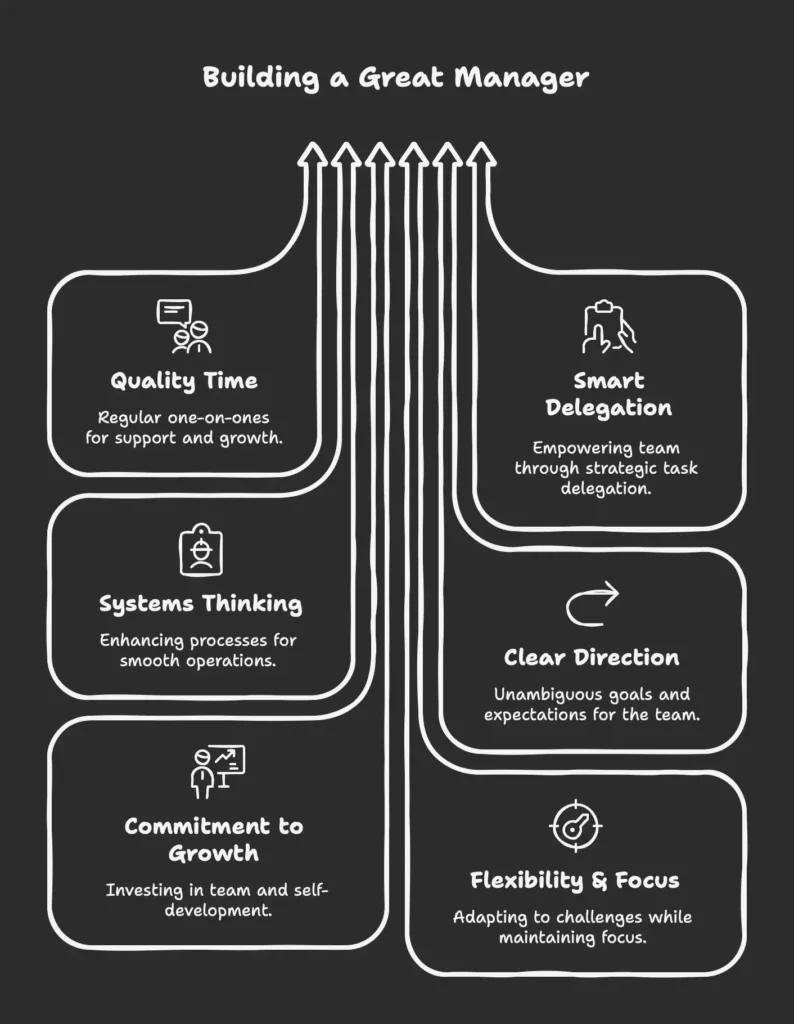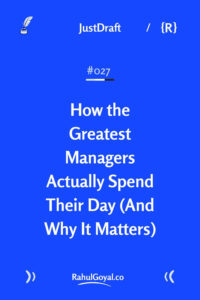How the Greatest Managers Actually Spend Their Day
As I reflect on my journey as a leader, I often think about how the greatest managers spend their days or what is great managers daily routine look like. It’s a question that puzzled me when I first started out, but over the years, I’ve had the privilege of working alongside some truly exceptional leaders, entrepreneurs to the genius behind Microsoft Excel, I’ve watched and learned.
What struck me most? These people don’t just “wing it” with their time. They have a thoughtful approach that keeps them both productive and balanced.
They don’t just react to what’s happening around them. They set the agenda, focus on what truly matters, and create an environment where their team can thrive. Here’s a breakdown of how they do it.
One Topic: Great Managers Daily Routine
The Morning Foundation
You may be heard thousands times in the past, and yeah it’s true. Great managers typically start early—around 5-6 AM. This quiet time helps set the tone for the day, whether it’s through exercise, meditation, or simply enjoying breakfast without interruptions. It creates a moment of clarity before the day’s demands kick in.
After these rituals, they prioritise their tasks using frameworks like the Eisenhower Matrix (sorting tasks by importance and urgency). This isn’t just about checking boxes—it’s about focusing on what actually matters.
The morning hours, when energy peaks, are reserved for deep, focused work.
The best managers know it’s not about being busy; it’s about being effective.
What Makes Their Day Different?
Here’s what truly sets exceptional managers apart or great managers daily routine looks like in general:
- Quality Time with Team Members – They hold regular one-on-one sessions that go beyond basic check-ins. These meetings offer support, maintain accountability, and foster both personal and professional growth. The magic number? Connecting with each team member at least every other week.
- Smart Delegation – Great managers don’t just pass tasks down—they match the right people with the right responsibilities. This empowers team members while freeing the manager to focus on high-level decisions.
- Systems Thinking – The truly exceptional managers spend time working “on” their business, not just “in” it. They step back from daily tasks to improve the processes that keep everything running smoothly—refining one-on-one systems, enhancing accountability methods, and reinforcing company values.
- Crystal-Clear Direction – In a world where 54% of employees feel their managers lack clear direction, the best leaders make expectations unmistakable. They use multiple channels to make sure everyone understands the goals and how to reach them.
- Commitment to Growth – Top managers invest in both their own development and their team’s growth. They identify improvement areas, provide training, and hold everyone accountable to personal development goals. It’s not surprising that organizations with strong learning cultures are 92% more likely to innovate.
- Being Flexible While Staying Focused – Even the best-planned day won’t always go as expected. Great managers leave room for unexpected challenges—whether it’s a last-minute request from leadership or a team member needing support. They don’t get overwhelmed; they adapt.

The Balance Factor
Here’s what really shocked me: the greatest managers aren’t constantly swamped or stressed. They’ve mastered the art of setting boundaries and maintaining work-life balance. They’re not in meetings all day or buried under endless to-do lists.
Instead, they create space for the unexpected—whether it’s a sudden project from above or a team member needing help. They’re prepared to adapt without getting overwhelmed.
As you think about your own approach to management, remember that it’s not about copying someone else’s playbook. It’s about finding what works for you and your team, then constantly refining it.
Read last week’s JustDraft newsletter about Best Mental Models used by Entrepreneurs.
Two Quotes
The true test of leadership isn’t how busy you are, but how effectively you create time for what actually moves the needle.
Great managers don’t just respond to the urgent; they make space for the important work that never shows up on a calendar invitation.
One Passage From A Book
Effective executives, in my observation, do not start with their tasks. They start with their time. They do not start out with planning. They start by finding out where their time actually goes. Then they attempt to manage their time and to cut back unproductive demands on their time.
📚 From ‘The Effective Executive’ by Peter Drucker

